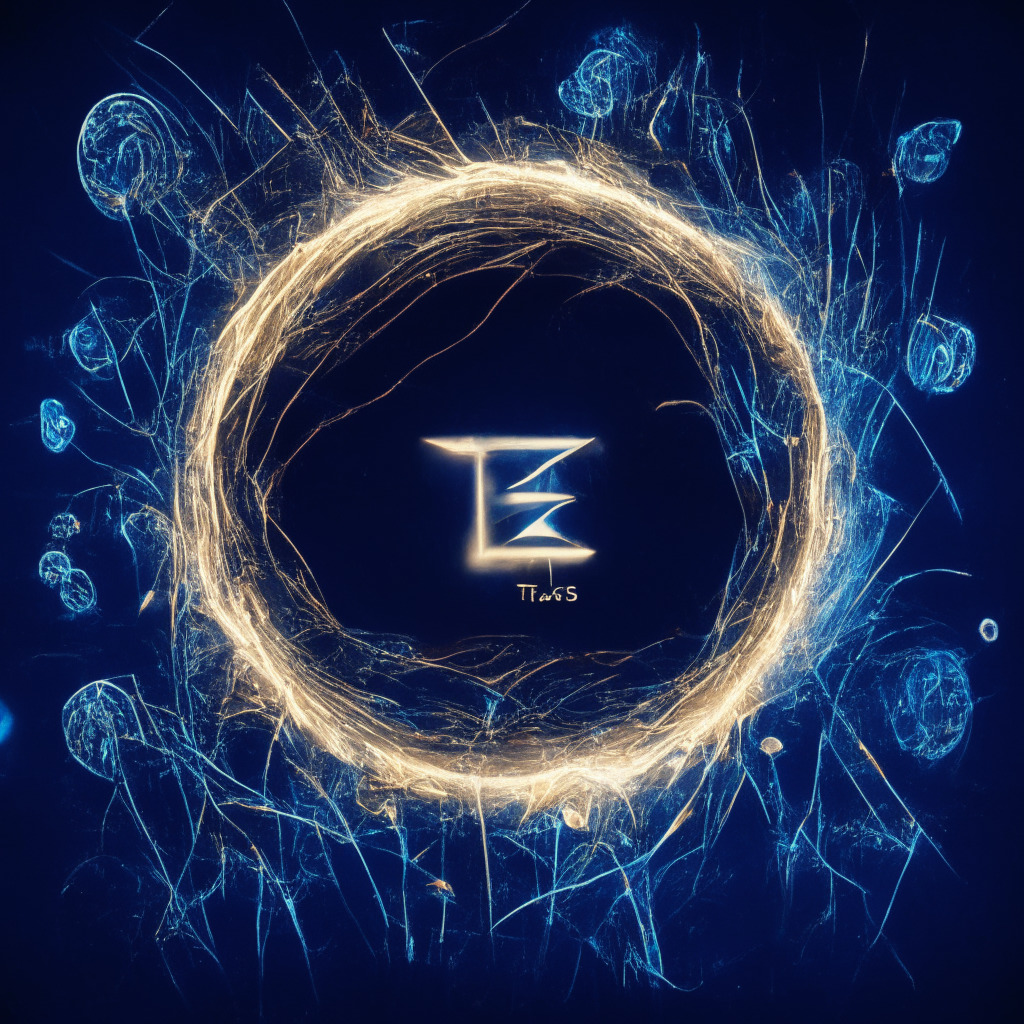“Meta’s new tool, ‘Code Llama’, offers a community-licensed AI meant for generating and discussing computer coding. This platform could prove critical for businesses and individuals, including bot developers and crypto exchanges. However, it also prompts questions around neutrality and US SEC scrutiny, especially as it signifies a move towards blockchain and crypto project decentralization.”
Search Results for: LLaMa
Alibaba’s AI Rivals Meta’s Llama 2: Unpacking the Open Source Drama and Consequences on DeFi
Alibaba has disclosed two novel open-sourced AI models, Qwen-7B and Qwen-7B-Chat, aiming to enrich AI operations. These models support the academia, researchers, and commercial institutions, offering code, model weights, and documentation access. However, large corporations need a license for use.
Alibaba’s Adoption of Meta’s AI Model Llama: Progressive Leap or Strategic Misstep?
“Alibaba, the first Chinese company to use Meta’s AI model Llama, signals a shift to zero-cost development programs. It raises questions about ties between China and Meta, and highlights complexities in the evolving landscape of AI adoption and open-source model integration. The role of such technologies in shaping our world remains to be seen.”
Meta’s Controversial Release of LLaMA AI: Examining Security Risks and Ethical Implications
U.S. Senators Blumenthal and Hawley criticize Meta’s “unrestrained and permissive” release of AI model LLaMA, fearing its potential misuse in cybercrime and harmful content generation. They question Mark Zuckerberg about risk assessments and mitigation efforts prior to LLaMA’s release, emphasizing the importance of responsible AI development and oversight.
Meta’s LLaMA Drama: Senators Scrutinize Leak and Potential Misuse of AI Model
U.S senators raise concerns over Meta’s large language model (LLaMA) potential misuse in harmful activities, questioning Meta’s risk assessment and preventive steps. LLaMA’s leak increased accessibility to high-quality AI models, prompting scrutiny on the balance between innovation and risk.
Navigating Murky Waters: The Saudi-Chinese AI- Blockchain Venture and Binance’s IRI Commitment Review
Saudi Arabia and China are collaborating to create AceGPT, an Arabic-based AI system designed for Arabic queries. Despite its potential, concerns arise over misuse of sensitive information and neglect of safety checks. Meanwhile, the blockchain Industry Recovery Initiative receives criticism for lack of funding transparency amid falling crypto venture funding.
Tezos (XTZ) Surges 11%: A New Bull Run or Just a Temporary Surge?
“Tezos (XTZ) experienced a surge of over 11% in a single day, linked more to technical factors rather than fundamental ones. However, the Tezos blockchain’s stagnant TVL (Trade Value Locked) and declining monthly transactions cloud its future prospects. Crypto presales, despite inherent risks, could offer high-risk-high-reward strategies.”
Crossroads of Innovation and Security: EU’s Proposed Regulations on Large-Scale AI Models
The European Union is reportedly discussing stricter regulations on large-scale language models (LLMs) like OpenAI’s GPT-4 and Meta’s Llama 2, aimed at controlling these models without overloading start-ups. These discussions touch on the implications of LLMs, user safety, and ethical AI deployment, mirroring the approach of the EU’s Digital Services Act.
Zuckerberg’s Bet on AI for Meta’s Metaverse Dominance: Visionary Leap or Blind Hope?
Meta’s CEO, Mark Zuckerberg, highlighted the crucial role of AI in the development of the metaverse during a recent interview. By leveraging technology that integrates VR/AR and AI, Zuckerberg aims to establish Meta’s dominance in the 3D immersive metaverse. Despite financial setbacks, he remains committed to the metaverse vision, betting on Llama 2’s technology integration with Meta AI as their unique competitive edge.
Decentralized Social Network Friend.tech Surpasses Protocol Fees by ETH 11,000: A High Risk Success
Friend.tech, a decentralized social network built on Coinbase’s Base and linked to Twitter, is gaining traction with almost ETH 11,000 in protocol fees. It currently ranks third in 24-hour fees, surpassing established platforms like OpenSea, Tron, and layer-1 & layer-2 giants such as Uniswap, Bitcoin, and MetaMask.
Bounty for Hackers: An Unconventional Solution to Crypto Exchange Security Breaches
“After a security breach resulting in an $8 million loss, cryptocurrency exchange HTX reassured users about their deposits’ safety, marking the continuing debate over crypto market security. Shareholder Justin Sun responded unorthodoxly, offering a bounty to the responsible hacker and hinting at hiring them as a security advisor.”
Surging Success of Coinbase’s DeFi Network Base: A Flash in the Pan or Future Heavyweight?
Coinbase’s layer-2 network, Base, has surpassed Solana in total value locked (TVL), with a significant 97.21% surge. This increase is majorly driven by decentralized exchange Aerodrome Finance and decentralized social media app Friend.tech. With legislative changes and regulatory scrutiny in play, Base’s future prominence in the crypto world remains uncertain.
Surging Ahead: Base Trumps Solana in DeFi TVL, But Is This Sustainable?
“Coinbase’s layer 2 network, Base, has outperformed Solana in the decentralized finance sector, surpassing it in total value locked (TVL). With a significant 97.21% increase in TVL over 30 days, Base emerged as a key player thanks to two Base-native projects, Aerodrome Finance and Friend.tech, despite the inherent volatility of the crypto domain.”
Cardano’s Ambiguous Journey: Rising against Odds, yet Challenged by Regulatory Shadows
“Cardano (ADA), the layer-1 blockchain protocol, has been cautiously ascending, with a 6% uptick since Monday but still undergoing a 30% drop since July. The uptrend moved ADA’s market cap ahead of Dogecoin’s, making it the seventh-largest crypto by market cap. However, ADA’s potential U.S adoption might be hindered by the U.S SEC’s attempts to label ADA an unregistered security.”
Lido Enlists Cosmos Projects in a Liquid Staking Shift: A Blockchain Tsunami or a Centralization Risk?
“Lido, a significant player in the Ether staking landscape, collaborates with projects from the Cosmos blockchain ecosystem, indicating growing interest in liquid staking. With $16 billion in derivatives, liquid staking has become a major strategy for digital asset investors, providing inter-chain transaction opportunities and increased liquidity while also raising concerns about centralization.”
Sushi’s Blockchain Leap: Breaking Boundaries or Overextending its Reach?
Decentralized exchange Sushi is extending its services to non-Ethereum Virtual Machine compatible blockchain, Aptos, marking a major development. This strategic move could potentially attract fresh capital towards Aptos while enhancing cross-chain trading experiences and opening up new possibilities for liquidity across major blockchain networks.
Meta’s AI Showdown: A Winsome Leap Forward or a Costly Misstep?
“Meta plans to develop an advanced AI model, potentially surpassing OpenAI systems. However, concerns arise around data center construction, chip supply, and ethical issues. Interestingly, AI and crypto’s convergence could pave the path to a tech-advanced future, but with challenges.”
Harnessing AI to Mirror Bias: The Case of OpinionGPT and Its Limitations
Researchers at Humboldt-Universität zu Berlin have developed an AI model, ‘OpinionGPT’, trained on Reddit data to reflect bias from certain demographic groups. However, the model encounters criticism for its questionable accuracy in representing real-world biases, indicating a representation of Reddit stereotypes rather than wider demographic sentiment.
Decentralized Exchange Brine Fi Secures $16.5M Amid Market Slump: A Game Changer or Mirage?
“Decentralized exchange Brine Fi has secured a $16.5 million investment led by Pantera Capital, despite the recent dip in venture capital for digital assets. Based on Ethereum scaling system StarkWare, Brine Fi offers a non-custodial, decentralized orderbook with privacy for trading positions. Pantera Capital praises its potential for mainstream and institutional adoption in DeFi.”
Resurgence of Synapse’s SYN Token: A Tale of Recovery or A Reminder of Cryptocurrency Volatility?
“Synapse, a recognized DeFi protocol, regained 17% after an unexpected 25% dip this week due to a 9-million SYN token offload from Nima Capital. Post-dump, SYN witnessed unprecedented trading activity reaching a new 24-hour record of over $25 million.”
Navigating the Uncertain Waters of AI Progress and Blockchain Fluctuations
“Baidu, China’s tech powerhouse, has released over 70 AI models with over 1 billion parameters each. Recent models show up to a 50% improvement in efficiency. However, the rapid expansion of AI technology raises concerns about misuse and privacy.”
MakerDAO’s Counter-Market Surge: A Profitable Anomaly or a Dangerous Catch?
Despite the downturn in cryptocurrency prices, Maker (MKR) saw a significant rise due to modifications made to its lending rates in its core strategy. This reflects in MakerDAO’s recent bounce back to profitability, contrasted by a crypto market drop. The platform also launched a token buyback plan, boosting investor profits. Nevertheless, caution in investing practices is advised due to the unpredictable nature of the crypto space.
Decoding Aerodrome’s Sudden $150 Million Boom: An Analysis of Base’s Newest DeFi Phenomenon
Aerodrome, a collaboration between Velodrome and Base developers, raised $150 million less than a day after being released on Base. With the goal of replicating Velodrome’s success, Aerodrome offers AERO tokens to users who provide liquidity, conduct token swaps or participate in governance.
Pioneering DeFi on Base: Aerodrome’s Launch with Promising Prospects and Steep Hurdles
“Velodrome has launched Aerodrome, a decentralized exchange (DEX) for Coinbase’s layer 2 blockchain, Base, aiming to deliver low fees and minimal slippage. This marks the start of the DeFi era on Base, stressing on transparency and rewarding users via airdrops of governance token, AERO. Despite facing challenges in a high-competition market, it signals ongoing innovation in DeFi.”
Ethereum Staking Thrives Amidst DeFi Assets’ Notable Slump: A Dual Reality in Crypto Sector
Despite substantial withdrawals from the DeFi sector and major crypto exchange meltdowns, Ethereum staking through platforms like Lido and Coinbase has surged. However, the value locked in DeFi protocols has dropped significantly from a peak of $178 billion in November 2021, to under $38 billion today. Staking services are becoming increasingly attractive to investors due to potential profitability and decreased protocol risks.
Decentralized Finance: A Revolutionary Potential Sailing Rough Waters
“The capital held in decentralized finance (DeFi) protocols has dipped to $37.5 billion, its lowest since February 2021. This drop comes amidst concerns about governmental regulations, falling crypto prices, and recent scandals. Despite Ethereum’s rise, DeFi’s total value locked (TVL) has contracted, suggesting inherent challenges exist in the DeFi market.”
Unpacking the Surge of Base: Advancements, Drawbacks, and the Upcoming Blockchain Revolution
“Base, a layer 2 blockchain, surprisingly outperforms Ethereum with an unprecedented average of 15.88 TPS. Friend.tech powered investor surge, despite potential regulatory hurdles, contributed to Base’s astonishing 156% growth. This fast-paced development, however, raises concerns about potential scalability issues.”
Coinbase’s Curveball: Acquiring Stake in Circle and Impact on USDC, Coupled With Emerging Legal Battles and Friend.tech’s Surprising Growth
Cryptocurrency exchange Coinbase acquired a minority stake in Circle Internet Financial, causing the dissolution of their Centre Consortium venture, responsible for issuing USD Coin (USDC). Despite this, Circle plans to continue in-house issuance and governance of USDC, which is expanding its support network to include six additional blockchains. Notably, no cash was involved in the transaction between Coinbase and Circle.
Blockchain Revolution: How Friend.tech Makes Huge Strides in Crypto Market in Less Than a Month
“Friend.tech, a Twitter-associated blockchain application recently outperformed several large-scale projects by marking a revenue of $840,889 over a 24-hour cycle. Within 30 days post-launch, its cumulative revenue ascended to $2.95 million. The app tokenizes crypto personalities on Twitter, enabling users to buy and sell ‘shares’ of these individuals.”
Privacy vs. Transparency in Blockchain: A Look at Friend.tech’s Controversial Crypto Wallet Leak
“In the blockchain sector, privacy and security are essential. However, the release of a list of crypto wallet addresses connected to Friend.tech users on a GitHub repository stirred controversial discussion. The concern arises from the potential of viewing blockchain transactions linked to those wallets. As the blockchain technology continues to infiltrate social platforms, users should remain wary of the risks associated with data visibility.”
Dissecting the Buzz Around Friend.tech: A New High in Crypto or Regulatory Overstep?
Friend.tech, a social tokenization protocol, shows promising revenue generation within the crypto sphere. With Friend.tech, personalities can issue shares for exclusive group chats, amassing around $709,000 in ether revenue in a day. Besides its appealing growth, the platform raises questions regarding over-economic focus and regulatory oversight.
Soaring or Falling? Investigating Friend.tech’s Impact on Decentralized Social Media
“Friend.tech, a decentralized social media app on Coinbase’s layer-2 network Base, enables users to purchase ‘shares’ of friends and influencers. Despite concerns over unsustainable growth and share price surge, it has gained over 64,000 users, earning $4.2 million since public launch.”































